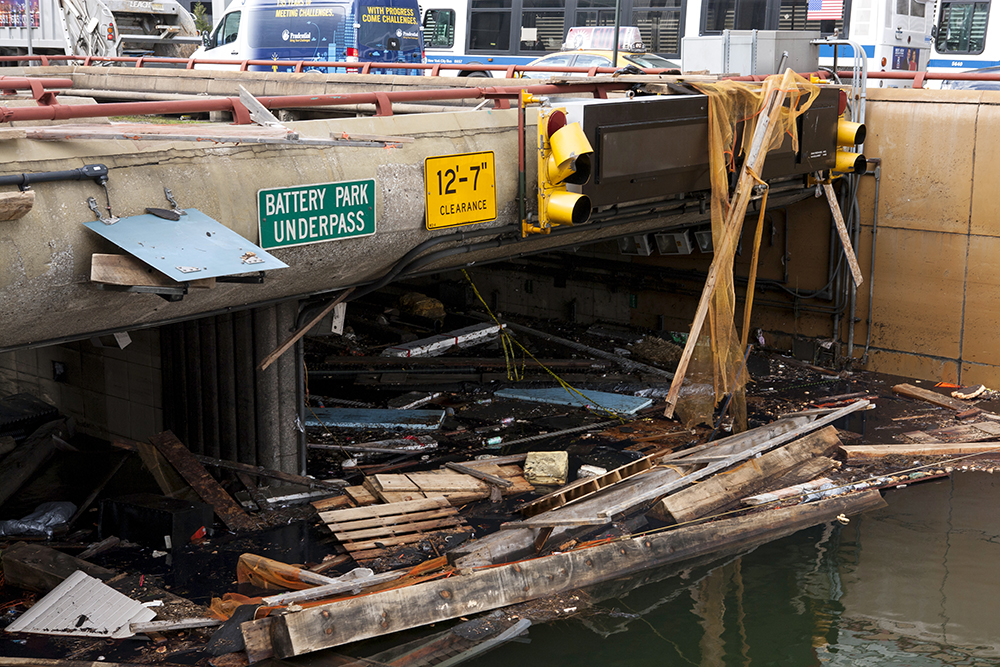
|
 |
The Battery Park Underpass in Manhattan, a major thruway in the city, flooded with seawater during Superstorm Sandy. This is only one example showing our nation's need for more climate-resilient infrastructure. Photo courtesy of the NYC Department of Transportation. |
|
As nations gather in Glasgow, Scotland, for the 26th United Nations Climate Change Conference of the Parties (COP26), the NOAA Climate Program Office has announced an important new partnership with University of Maryland (UMD) researchers and the American Society of Civil Engineers (ASCE) to accelerate the development of climate-smart engineering codes and standards.
The collaboration will advance the use of NOAA-produced climate science and understanding within engineering practice for the design and construction of climate-resilient infrastructure, through developing and updating ASCE codes and standards. The partnership calls for a series of exchanges between NOAA and ASCE, which will be facilitated by the UMD Center for Technology and Systems Management, led by UMD civil and environmental engineering (CEE) professor Bilal Ayyub and associate director Dan Walker.
The exchanges will make clear the needs of the engineering and standard-setting community as well as clarify the extent to which NOAA can provide the data and future weather and climate projections that are needed to update and refine codes and standards.
Samuel Graham, Jr., dean of UMD’s A. James Clark School of Engineering, said the partnership will help close the gap between climate change awareness and engineering practice. “Society wants and needs solutions to the world’s grand challenges like climate change; engineers will play a central role in every solution," he said. "The built environment—homes, stores and office buildings—are as affected by climate change as the natural environment and if designed improperly, help to contribute to the problems we are seeing today. Translating that knowledge into building best practices is what our new joint endeavor is all about. We're glad to partner with the government and industry to help protect people and property."
Awareness of the importance of climate resilience is growing among the community involved in siting, design, and construction of the built environment, said Ayyub, the author of an ASCE Manual of Practice on the topic. Nevertheless, he said, challenges remain.
“Chief among these is the well-documented gap between current understanding of the evolution of the probability of weather and climate extremes and engineering practice,” Ayyub said.
Added Walker, “The lack of appropriate incorporation of information about future weather and climate in the various standards and associated building codes is a significant challenge, even for the well-informed civil engineer.”
More details about the partnership between NOAA, ASCE and UMD will be provided during a virtual panel discussion at COP26 on Tuesday, November 9, from 1 PM to 2 PM ET/ 6 PM to 7 PM GMT. The panel, Building Better Together: Partnerships to Advance Climate Resilience, will include NOAA Administrator Rick Spinrad, as well as representatives from ASCE, non-profit partners and the engineering industry. It will be moderated by Ayyub. The NOAA-hosted panel will be live-streamed on the official COP26 U.S. Center YouTube channel. Go online for a full schedule of events and panels at the U.S. Center at COP26.
“This partnership can help us accelerate the move toward more climate-resilient infrastructure for the nation and globally,” Spinrad said. “Our goal is to bring climate information into the nation’s standard-setting process to increase the pace of climate adaptation and reduce design, construction and maintenance costs as well as the costs of climate-related natural disasters.”
ASCE’s executive director, Tom Smith, said the organization fully supports the partnership with NOAA and UMD. “The results will be of critical importance in supporting the development of standards for resilient infrastructure nationally and globally.”
The UMD Center for Technology and Systems Management is housed within the CEE department, part of the Clark School. It has access to campus-wide expertise in many climate-related, environmental science, engineering and policy fields.
ASCE is a tax-exempt professional body founded in 1852 to represent members of the civil engineering profession worldwide that is headquartered in Reston, Virginia. ASCE is dedicated to the advancement of the science and profession of civil engineering and the enhancement of human welfare through the activities of society members.
Climate, weather, and water affect all life on our ocean planet. NOAA’s mission is to understand and predict our changing environment, from the deep sea to outer space, and to manage and conserve America’s coastal and marine resources. See how NOAA science, services, and stewardship benefit your community: Visit noaa.gov for our latest news and features, and join us on social media.
Related Articles:
Sea Level Rise Could Leave Many Marooned
Grant Awarded for Study of Climate-Induced Septic Tank Failures
No Easy Way Home
Niemeier Explores Link Between Infrastructure, Inequity
UMD’s Ayyub Leads Use of Climate Information for Infrastructure Adaptation
Conduit Study Wins Capstone Expo Award
Key Bridge: What Comes Next?
A Wider Lens
More Effective, Equitable Disaster Policy
Researchers Urge Overhaul of Disaster Policy
November 3, 2021
|

